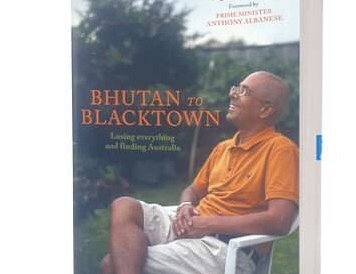
Foreword in a book, especially in nonfiction, is something no serious reader would like to skip. Essentially, it is through this section the reader can make an educated guess about the intrinsic value of the volume at hand. If written by a prominent scholar, the introductory note adds weight to the content the author is offering. And it is not very often that a sitting prime minister of a country finds reason as well as time to share his/her views on a book. Prime Minister Anthony Albanese of Australia has precisely done that for a book written by Om Dhungel who was born—and grown up—in Bhutan but now settled in Sydney’s Blacktown neighborhood. Dhungel is genuinely delighted by the honor bestowed upon him by Mr. Albanese. His foreword penned for BHUTAN TO BLACKTOWN is short but pithy. Fully aware of the “circumstances under which Om had to leave his homeland”, Mr. Albanese appears understandably pleased by Dhungel’s ultimate choice, and promptly calls it “a great Australian story”. Those in Australia—and beyond—are sure to be encouraged to understand how Australia is gradually enriching its multicultural landscape.
The trajectory Dhungel, born in 1961, had to undertake in the quest for a place to survive is simply treacherous—literally as well as figuratively.
Bhutan, the country of his birth, suddenly became unsafe for one-fifth of the country’s 750,000-strong population. To King Jigme Sighye Wangchuk, his loyal subjects living in the southern region of the kingdom since the 17th century abruptly became a liability. Or that is what his courtiers persuaded him to believe in. Otherwise, he would not disown the precious human asset—a peaceful and hardworking community. Bhutan, the kingdom often fantasised in the West as a Himalayan Shangri La, has a repressive monarchy that began executing its policy of systematically evicting Nepali speakers from their homes—and thereby from the country—describing them as illegal foreigners. To implement this scheme, the royal government first issued a law in 1985 making it retroactively effective from 1958. Peremptory orders started to come from Thimphu, the kingdom’s capital, to the administrators in the southern districts to make preparations aimed at driving Lhostshampas (southerners) out of the country forever. Accordingly, schools teaching the Nepali language were closed, the language itself was de-recognized, dresses were banned, and Hindu rituals were disallowed even during the funeral. People were forced to abandon their cultural heritage. Those who dared to resist the royal command were arrested and tortured in detention. Many lost their lives and limbs during the
days of turbulence.
Those who made a representation of Lhotshampas at the king’s court were eventually declared Ngolops (anti-nationals) and imprisoned. Tek Nath Rizal was one such leader. Simultaneously, a handful of talented Nepali-speakers from the south who had risen to be high-level government officers at Thimphu were made to face charges ranging from disloyalty to corruption. At one point it became untenable; they were forced to flee their country, some of them leaving their extended families behind, in unsafe and uncertain circumstances. Om Dhungel was one of such officials to enter Nepal—through Indian territory (Nepal doesn’t have a contiguous border with Bhutan). All of these expulsions, a clear case of ethnic cleansing, happened in the early 1990s. And it coincided with the dissolution of the Soviet Union on the world stage, and a pro-democracy movement in neighboring Nepal. Agitating leaders were busy transforming a powerful monarchy into a constitutional one—on the
British model.
In any case, the eviction of a large number of Nepali-speaking Bhutanese, numbering over 100,000, would not have been possible without the connivance of the Indian government. After all, the treaty India and Bhutan signed in 1949 said Thimphu would be guided by Delhi in the conduct of its external relations!
Om Dhungel’s book is not just a personal memoir. It depicts a larger picture of the people uprooted from their homeland, forced to live a pathetic life in UNHCR-run refugee camps set up in the eastern districts of Nepal. As a journalist, I visited those camps and interviewed umpteen numbers of refugees, most of whom had land/tax receipts to prove that they were Bhutanese from the time long before 1958. My facts-based stories reached international audiences through the Reuters news agency, TIME magazine, and BBC among others. As is known to all concerned, more than 15 rounds of bilateral negotiations between Nepal and Bhutan failed to produce an agreement that would facilitate the repatriation of refugees. Frustrated refugees thereafter made attempts to return to their homeland on their own, but the Indian authorities stopped them on the border. One is at a loss to understand why the Indian authorities had not stopped them earlier when they were being driven out of Bhutan. On the contrary, the Indian police had swiftly pushed them towards Nepal’s easternmost border point in a convoy of truckloads.
Uncertainty prevailed for several years in the refugee camps where new births were being steadily recorded. The UN refugee agency, UNHCR, began to realise that the support from donors was receding markedly. Eventually, the resettlement of refugees in third countries surfaced as an alternative. Subsequently, countries like the US, UK, Australia, Canada, and a couple of others agreed to take them in. However, some of the refugees, about seven thousand, did not accept the offer. They still are in locally-managed camps—waiting for the day when they will be able to return to Bhutan. Dhungel, in his book comprising a dozen chapters in 270 plus pages, describes himself as ‘an Australian by accident.’ That might have been the case in the initial phase. The situation has changed over time,
something he concedes.
“In Blacktown, I live among people from 188 countries,” he writes in the book launched in May. This implies that now Dhungel is not just a leader of the Bhutanese diaspora but also a member of a larger multicultural land called Australia.
James Button, a seasoned Australian journalist, appears to have made significant contributions to the publication and Dhungel acknowledges this by sharing his name on the cover as a co-author. Dhungel tells me that he is getting frequent calls from distant lands to appreciate his skills in writing such a thrilling book. His book is one of the titles lately on display at bookstalls of international airports. To the domestic readers, some of the pictures in the book are exotic enough to go well along with a breathtaking story of exile with an Australian ending.
Reproduced From The Rising Nepal
(Adhikary is a journalist active since 1978 and writes on regional issues. dhrubahari@gmail.com)
- Can One More Election Help Nepal To Be Stable ?
- Dec 27, 2013
- THREE-IN-ONE PUBLICATION
- Feb 24, 2013













